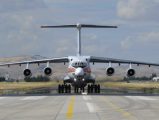Turkey OK’s American Drones to Fight ISIS
Turkey is now allowing the U.S. to launch unmanned aircraft to fly over Syria. But so far, traditional warplanes are out of the question.
Send in the drones. But keep the manned aircraft at home.
That’s the message from the Turkish government to the U.S.-led coalition bombing ISIS and other extremists in Syria.
Despite some recent signals from the Turkish government that it was finally ready to partner with the United States and others in the new war against ISIS, there is still a major snag.
U.S. officials working on the diplomacy and intelligence components of the new war tell The Daily Beast that Ankara is still prohibiting the United States from flying manned aircraft from the U.S. airbase in Incirlik, Turkey. Instead, the Turks are allowing only drones to take off from the base.
“They are letting us do a ton of signals work,” a U.S. official working the issue said, using military jargon for the interception of hostile communications. “They have not objected to just about anything on the surveillance side. The fights have been about manned aircraft coming in and out.” The dispute over flying the manned aircraft has been a source of considerable tensions behind the scenes since the U.S. campaign against ISIS began in August. But the outlines of that dispute spilled out into the open this week.
National Security Advisor Susan Rice said Oct. 13 on Meet the Press that Turkey had agreed to let its bases be used in the fight against ISIS, but several senior Turkish officials rushed to deny Rice’s claim. “There is no decision at the moment concerning Incirlik or any other issue,” Turkish foreign minister Mevlut Cavusoglu said the next day. Turkey has publicly called for a no-fly zone and for airstrikes against the Assad regime.
On Tuesday, Secretary of State John Kerry claimed that the U.S. and Turkey were on the same page. “[Turkey] certainly has allowed the use of certain facilities, and we don’t need to get into specifics except to say that I don’t believe there is any discrepancy with respect to what they will or won’t do,” he said.
But White House Press Secretary Josh Earnest said Tuesday that there was still no formal agreement between the U.S. and Turkey over using Turkish bases in the fight against ISIS. “This issue of military bases in Turkey is an issue that continues to be discussed between American officials and Turkish officials,” he said.
One U.S. intelligence official told The Daily Beast that overall Turkey has been willing to allow the United States to fly drones out of Incirlik but has not allowed the United States to fly manned aircraft. Instead, those missions have been flown from other locations and from aircraft carriers stationed in the region.
Another U.S. official working on the new war against ISIS and al-Nusra confirmed this information. Both sources requested anonymity because they were discussing classified information.
The Turkish press has also reported that some drones are flying out of Turkey. “There are activities that we are already undertaking jointly from Incirlik, concerning Iraq: the Predators, the reconnaissance flights can continue,” Turkish prime minister Ahmet Davutoglu told Milliyet earlier this month, referring to unmanned aerial vehicles. “But as a base for a more extensive operation — if they are expecting the contribution of any country — we have already made our position clear: there has to be a no-fly zone and a safe haven must be declared,” he said.
The Incirlik base is important. In 2011, after Obama ordered all U.S. troops out of Iraq, some of the most sensitive military aircraft, drones, blimps and other sensors housed in Iraq were positioned at the Incirlik base. In the 1990s the U.S. flew missions over northern Iraq when Saddam Hussein was in control of that country from the Incirlik air base.
Turkey has been a fair weather ally against ISIS and al-Nusra as well. U.S. officials have publicly testified in the last year that new western recruits often travel through Turkey to get to Syria to join ISIS and al-Nusra. U.S. officials now say Turkey has started to take steps to cut down on the number of foreign fighters traveling through Turkey into Syria.
Ret. Gen. John Allen, the President’s designated coordinator for the anti-ISIS coalition, told reporters Tuesday that a team of military officials from Central Command and European Command were still in negotiations but nothing has been settled.
“The conversation with respect to how those kinds of details will ultimately be resolved is underway right now,” Allen said, noting that Turkey has made some additional commitments to the coalition, such as agreeing in principle to host one of the bases that will be used to train and equip Syrian rebels.
Spokesmen for the Pentagon and CIA refused to comment for this story. Patrick Ventrell, a spokesman for Rice, declined to explain why the National Security Advisor announced that the Turks had agreed to open permissions for the use of their bases. But there is broad agreement between Washington and Ankara as to how the fight against ISIS should proceed, he said.
Πηγη:thedailybeast





















